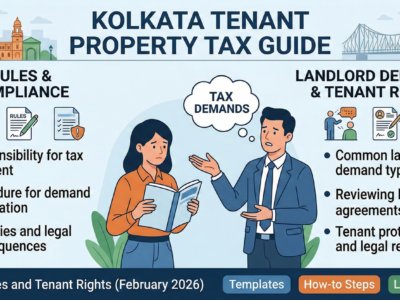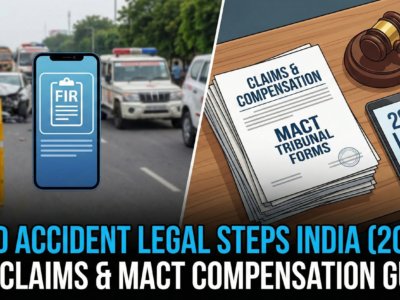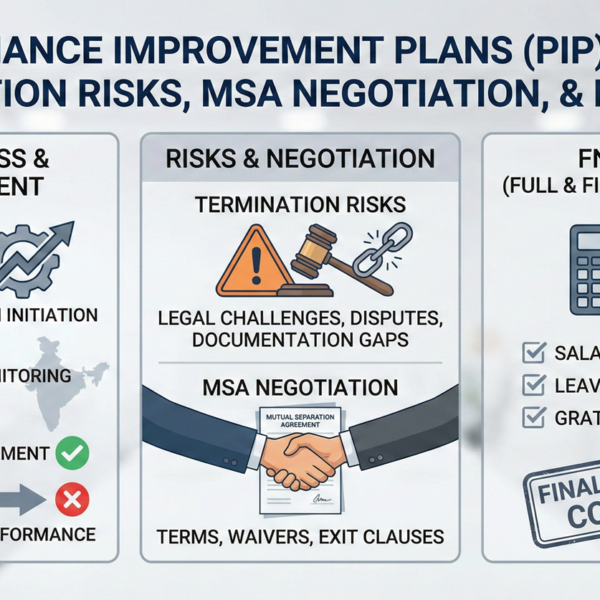A tenant asking for your legal ownership documents, like a sale deed or registry, is a common but stressful situation. Your caution is justified. You should not hand over these sensitive documents. The tenant’s request is likely genuine. They are probably responding to a query from a GST officer who rejected their application. The officer may be misinformed or asking for more documents than the law requires. This is a known issue in the GST registration process.
GST Compliance
A Landlord's Guide to Tenant GST Registration Requests
My tenant wants my property registry for GST. What should I do?
By the Evaakil.com Legal Team | Updated: October 2025
A tenant asking for your legal ownership documents, like a sale deed or registry, is a common but stressful situation. Your caution is justified. You should not hand over these sensitive documents.
The tenant's request is likely genuine. They are probably responding to a query from a GST officer who rejected their application. The officer may be misinformed or asking for more documents than the law requires. This is a known issue in the GST registration process.
The Safe and Correct Alternative
You can deny the request for registry papers and provide this legally correct document package instead:
- A copy of the existing Rent Agreement.
- A No Objection Certificate (NOC) / Consent Letter (see template below).
- A copy of a supporting document in your name, such as the latest Electricity Bill or Property Tax Receipt.
What's Your Situation?
Select your concern to see the immediate guidance.
Action: Provide the Secure Package
Your tenant needs to prove their right to use the address. The rent agreement alone is not enough. You must provide the complete package: (1) Rent Agreement, (2) a signed NOC, and (3) a copy of a utility bill or property tax receipt. This package satisfies the legal requirement without exposing your sensitive ownership deed.
Why Is GST Address Verification So Strict?
Your question about "what even is the point" is valid. The strict verification is not about your tenant. It is the government's main defense against large-scale tax fraud.
The Problem: Bogus Firms and ITC Fraud
Fraudsters create "shell companies" at fake or non-existent addresses. They use forged rent agreements and utility bills to get a real GST number. These fake companies then issue billions in fake invoices without selling any actual goods. The purpose is to illegally pass "Input Tax Credit" (ITC) to other companies, stealing huge sums from the government. Verifying the business address is the first and most important step to stop this fraud.
Infographic: The "Chain of Trust" for GST
To approve an application, the GST officer must verify a complete "chain of trust."
(Tenant's Right)
(Landlord's Proof)
(Landlord's Permission)
The Correct Documents: CBIC Guidelines
The Central Board of Indirect Taxes and Customs (CBIC) has issued instructions (like No. 03/2025-GST) to standardize the process and stop harassment. These rules outline what officers can and cannot ask for.
For rented premises, the applicant must always submit the Rent Agreement plus one supporting document in the landlord's name. The official list includes:
- Latest Property Tax Receipt
- Municipal Khata Copy
- Copy of an Electricity Bill
The No Objection Certificate (NOC) is also a mandatory document in most cases. It is the formal letter proving your consent.
Comparison: Registered vs. Unregistered Rent Agreement
The officer's request may change slightly based on your rent agreement type. The correct document package solves both scenarios.
| Scenario | Documents from Landlord | What Officers CANNOT Demand |
|---|---|---|
| Registered Rent Agreement | One copy of: Electricity Bill OR Property Tax Receipt. | Landlord's PAN, Aadhaar, Photo, or Sale Deed. (Prohibited by CBIC instructions). |
| Unregistered (Notarized) Agreement | One copy of: Electricity Bill OR Property Tax Receipt. PLUS a No Objection Certificate (NOC). |
Sale Deed / Registry Papers. |
The Tenant's Perspective: Why They Need These 3 Items
To understand your tenant's request, it helps to see what they see. When their application is questioned, they must upload documents to the GST portal. The system is designed for the 3-part package.
The GST officer sends a query: "Proof of Principal Place of Business is insufficient. Please upload consent letter and ownership proof."
The portal provides upload slots. The tenant uploads:
- Rental Agreement: In the "Rent Agreement" slot.
- NOC: In the "Consent Letter / NOC" slot.
- Watermarked Bill: In the "Ownership Proof" slot (e.g., Electricity Bill, Tax Receipt).
With these three documents, the "chain of trust" is complete, and the officer can approve the application without needing to request a sale deed.
A Landlord's Risk Analysis (The "What If")
Your fears about providing documents are legitimate. Here is an analysis of the real versus perceived risks.
Legal Deep Dive: Sale Deed vs. Possessory Proof
Your refusal to provide the sale deed is legally correct. The law requires the tenant to prove their *right to use* the premises, not prove your *absolute ownership*. A sale deed is a "title document," while a utility bill or tax receipt is a "possessory document." The GST department only needs possessory proof, which is less sensitive and proves the address is real and belongs to you (the person on the rent agreement).
Key Legal Distinction:
- Sale Deed (Title): Proves *who* owns the property. This is private, sensitive, and not required.
- Utility Bill (Possession): Proves *who* is in charge of the property. This is sufficient for GST verification.
Risk 1: Document Misuse and Fraud
A photocopy of your sale deed cannot be used to sell or mortgage your property. Those transactions require the original documents and in-person verification. The low-level risk is that a scammer could use it as a template to defraud someone else. A bigger, more modern risk comes from the utility bill. This bill contains your name, address, and account number, which are building blocks for identity theft. This is why watermarking is a good practice.
Risk 2: Property Tax Re-classification (The Real Financial Risk)
This is the most significant risk. GST law may allow a business registration at a residential address, but your local municipal law does not. If a municipal tax assessor finds out a business is operating from your home (using the public GST record), they can re-classify your property from "residential" to "commercial." This action can easily double or triple your annual property tax bill. This risk must be handled using an indemnity clause in your NOC.
Chart: Landlord Risk Profile
This chart visualizes the risks. The main concern is not document fraud or GST on rent, but the potential for a large property tax increase.
Risk 3: GST Liability on Your Rental Income
This is a common point of confusion. A new rule (post-July 2022) states that if a residential property is rented to a GST-registered person (your tenant), then 18 percent GST is due on the rent.
However, this tax is payable under the Reverse Charge Mechanism (RCM).
- What this means for YOU (Landlord): You have zero liability. You do not collect or pay this tax.
- What this means for your TENANT: Your tenant is 100 percent responsible for paying this 18 percent tax directly to the government, in addition to the rent they pay you.
You are financially safe from this tax. The tenant bears the entire burden.
Your 4-Step Action Plan for Secure Compliance
Follow these steps to resolve the situation professionally and safely.
Step 1: Assemble the Secure Document Package
Gather these three items for your tenant:
- A copy of your existing Rent Agreement.
- A No Objection Certificate (NOC), drafted and notarized (see template below).
- A Watermarked Copy of your most recent Electricity Bill or Property Tax Receipt.
Step 2: How to Watermark Your Utility Bill
A watermark makes the document useless for identity theft but keeps it valid for GST verification.
- Scan your utility bill or tax receipt to a PDF or image.
- Use any simple editing tool to add text over the image.
- Make the text large, diagonal, and semi-transparent.
- Recommended Text: "COPY FOR GST REGISTRATION OF [Tenant's Company Name] ONLY."
Step 3: Use This Legally Protective NOC Template
Do not sign a simple one-line letter. Use a detailed NOC to protect yourself. It is best to print this on stamp paper and have it notarized.
No Objection Certificate (NOC)
Date: [Your Date]
Place: [Your City]
TO WHOMSOEVER IT MAY CONCERN
Subject: No Objection Certificate for GST Registration at [Full Property Address]
I, [Your Full Name], son/daughter of [Father's Name], am the lawful owner of the property located at:
[Full Property Address] (hereinafter "the Premises").
I confirm that I have entered into a Rent Agreement dated [Date of Agreement] with [Tenant's Name], proprietor/director of [Tenant's Business Name] (hereinafter "the Tenant"), for the use of the Premises.
I hereby state that I have NO OBJECTION to the Tenant using the Premises as their "Principal Place of Business" for the sole and specific purpose of obtaining registration under the Goods and Services Tax (GST) Act.
This No Objection Certificate is issued subject to the following conditions:
1. **Limited Purpose:** This consent is granted only for the Tenant's GST registration. It shall not be used as proof for any loan, trade license, or other purpose.
2. **No Liability:** I, the Landlord, am not a partner or agent in the Tenant's business. I shall bear no liability for the Tenant's business operations, debts, or tax liabilities.
3. **Property Tax Indemnity:** The Tenant acknowledges the Premises are classified as "Residential." The Tenant agrees to indemnify and hold harmless the Landlord from any and all claims, penalties, or financial liabilities, including any increase in municipal property taxes, arising from the re-classification of the Premises to "Commercial" as a result of this GST registration.
4. **No New Rights:** This NOC does not create any new tenancy rights, title, or interest in the Premises beyond the original Rent Agreement.
(Signature)
[Your Full Name]
(Landlord/Property Owner)
Witness 1:
Name:
Signature:
Witness 2:
Name:
Signature:
Step 4: Future-Proof Your Next Rent Agreement
To prevent this problem with future tenants, add a specific clause to your standard rent agreement.
Suggested Rent Agreement Clause
"USE OF PREMISES AND GST REGISTRATION: The Premises shall be used by the Tenant for residential purposes only. Any use of the Premises for commercial activity, including for registration under the GST Act, is strictly prohibited without the Landlord's prior, express written consent (NOC).
Should the Landlord grant such consent, the Tenant hereby agrees to indemnify the Landlord against any and all liabilities, penalties, or increases in municipal property taxes or other charges that may be levied on the Landlord as a direct or indirect result of the Tenant's business activities or GST registration at the Premises."
Module: Handling Advanced Scenarios
Your situation might have extra layers. Here is how to handle common complications.
Scenario 1: The Property is Co-Owned (e.g., by spouses or siblings)
If the property is jointly-owned, the GST officer may check if the rent agreement and NOC are signed by all owners.
- Best Practice: The Rent Agreement and the NOC should be signed by all co-owners listed on the property tax receipt.
- Practical Solution: If only one co-owner manages the property, that person can sign. However, they should also provide a simple "Letter of Authorization" signed by the other co-owners, permitting them to rent the property and issue the NOC.
Scenario 2: The Tenant is a Company (Pvt Ltd / LLP), not an Individual
This is a critical detail. If the tenant is a formal company, the legal "person" is the company itself, not the director.
- Check the Agreement: The Rent Agreement MUST be between "[Your Name]" (Landlord) and "[Tenant's Company Name Pvt. Ltd.]" (Tenant). It should be signed by a director *for* the company.
- Check the NOC: The NOC must state: "I have no objection to [Tenant's Company Name Pvt. Ltd.] using the premises..." If the agreement is in the director's personal name, but the GST is for the company, the officer will reject it immediately.
Scenario 3: The Tenant is Sub-letting from Your Original Tenant
This is a high-risk scenario and a common reason for GST rejection. The "chain of trust" is broken.
- The Problem: The sub-tenant has an agreement with your *tenant*, but the utility bill is in *your* name. The officer cannot link the sub-tenant to the property owner.
- The Only Solution: This requires a complete document chain: (1) Your original Rent Agreement with your tenant, (2) Your NOC allowing your tenant to sub-let, (3) The sub-let agreement, and (4) The utility bill. This is complex and often fails. It is not recommended unless all documents are perfect.
Final Checklist: Do's and Don'ts
What To Do
- ✓ DO provide the three-part package: Rent Agreement, Watermarked Utility Bill, and the detailed Notarized NOC.
- ✓ DO tell your tenant this package is the legally correct requirement per CBIC guidelines.
- ✓ DO advise your tenant to cite "CBIC Instruction No. 03/2025-GST" if the officer still argues.
What NOT To Do
- ✗ DO NOT provide your Sale Deed, Registry, or Possession Certificate.
- ✗ DO NOT provide your PAN Card or Aadhaar Card. CBIC instructions forbid officers from asking for these.
- ✗ DO NOT sign a simple, one-line NOC. Use the full protective template.
Frequently Asked Questions (FAQ)
Can I just give my PAN card instead?
No. Do not provide your PAN card. First, CBIC instructions explicitly prohibit officers from demanding the landlord's PAN. Second, your PAN card does not prove you own the *address*. The officer needs proof of the *premises*, which is what the electricity bill or tax receipt provides.
What if my electricity bill is in my father's name (who is deceased), but I own the property?
This is a common complication. The GST officer needs to link the person on the bill to you (the owner on the rent agreement). The easiest solution is to use the Property Tax Receipt, which should be in your name as the current owner. If that is also not in your name, you may need to provide supporting documents like a legal heir certificate or a probated will, but this complicates the tenant's application. Always try to use the Property Tax Receipt first.
My tenant is a friend/family member. Do I still need a formal NOC?
Yes. The NOC is not just a formality between you and the tenant; it is a required document for the GST department. It also serves as a critical legal record that protects you from financial risks, like the property tax increase. A formal, notarized NOC is always the correct procedure.
The GST officer is still refusing the documents. What now?
This can happen. Advise your tenant to formally reply to the officer's query. In their reply, they should attach the complete three-part package (Agreement, NOC, Watermarked Bill) and write a short note. In the note, they should politely state that as per "CBIC Instruction No. 03/2025-GST," this is the complete set of prescribed documents for a rented premises, and that demands for a sale deed are contrary to the board's guidelines.
What if the property is still under a bank loan? Is my NOC valid?
Yes, your NOC is completely valid. A bank loan (mortgage) does not affect your rights as an owner to rent the property or issue consent for its use. The NOC is a statement between you and your tenant; it does not involve the bank and does not violate your loan terms (assuming your loan permits renting).
My tenant's business is 'virtual' and they just need the address. Is this risky?
This can be very risky. This is known as a "Virtual Office" for GST. While not strictly illegal, it is a major red flag for GST officers looking for shell companies. The risk for you is that if your tenant is caught in fraud, your property address is on file. Furthermore, this is almost certainly a "commercial" use, putting you at high risk for property tax re-classification. It is best to avoid this unless you are renting to a legitimate, established professional (like a CA or lawyer) who works from home.









